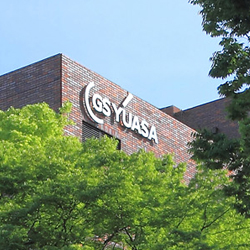In recognition of the achievements of GS Yuasa Corporation (Tokyo Stock Exchange: 6674; “GS Yuasa”) in the development and practical application of high-efficiency, high-durability lead-acid batteries for idle-stop vehicles, GS Yuasa has received the 46th Ichimura Industrial Award - Contribution Prize.
The Ichimura Industrial Awards are given by the New Technology Development Foundation to technology developers or groups for contributions to the growth of industry or industrial achievements through the development of excellent homegrown technologies. The award was established in 1968 as advocated by Ricoh Sanai Group founder Kiyoshi Ichimura.
The award was given this time in favorable recognition of the development and practical application of automotive lead-acid batteries with high durability and high regenerative charge acceptance performance as a technology that will further encourage the spread of idle-stop vehicles which effectively reduce CO2 emissions. An overview of the technologies developed and their outcomes are described below.
Going forward the GS Yuasa Group will continue contributing to people, society, and the global environment through the advanced battery technologies that it has developed over the years.
Development and Practical Application of High-Efficiency, High-Durability Lead-Acid Batteries for Idle-Stop Vehicles
Award winners
Takao Ohmae GS Yuasa Global Technical Headquarters, Automotive Battery Technical Department, General Manager
Masaaki Hosokawa GS Yuasa Global Technical Headquarters, Automotive Battery Technical Department, Manager
Yuichi Tsuboi GS Yuasa Global Technical Headquarters, Technical Development Division Department III, Manager
[Background behind the development]
The development and spread of idle-stop vehicles that improve automotive fuel efficiency and control CO2 emissions has progressed on a global level. Because idle-stop vehicle engines are stopped in situations such as waiting for traffic signals and traffic jams to improve fuel efficiency, this means that lead-acid batteries are needed to supply power to electrical equipment in vehicles while the engine is stopped and for the majority of the power supply required for restarting the engine. Additional fuel efficiency is achieved as the power output by the batteries is recharged utilizing the regenerative energy when the vehicle is decelerating (regenerative charging), which minimizes recharging through power generation using engine power. For this reason it has been desirable to improve the durability of lead-acid batteries in idle-stop vehicles against increased discharge load while also improving regenerative charge acceptance performance that enables discharge power to be recharged in a short period of time, in order to achieve high efficiency and high durability capable of withstanding the severe use environment unique to idle-stop vehicles.
[Overview of the technology developed]
The following technologies have been developed in order to achieve the durability and regenerative charge acceptance performance required of lead-acid batteries for idle-stop vehicles.
1. Technologies for positive electrode active materials with higher density and degradation control additives
2. Corrosion-resistant surface alloy coating treatment for negative electrode lugs
3. Carbon additives technologies for negative electrode active materials
4. New additives technologies for electrolyte solutions
As a result, lead-acid batteries for idle-stop vehicles have been developed with 4.2 times*1 the durability for idle-stop vehicle use and 3 times*2 the regenerative charge acceptance performance for recharging in a short period of time (Illustration 1, Illustration 2) in comparison to GS Yuasa's conventional batteries.
*1.Durability: Based on the idle-stop life test standards of the Battery Association of Japan (as investigated by GS Yuasa).
*2. Regenerative charge acceptance performance: Based on a charge acceptance test assuming brake regeneration over a short period of time following vehicle operation (as investigated by GS Yuasa).
[Outcomes of the technology developed]
These technologies have enabled the practical application of lead-acid batteries with the high durability under severe use conditions as required for the success and spread of idle-stop vehicles. The technologies have already been adopted in the idle-stop vehicles of many manufacturers.
Through the spread of idle-stop vehicles the technologies developed have made a significant contribution to the reduction of CO2 emissions throughout our car-oriented society. As both global and domestic demand for idle-stop vehicles is expected to increase in the future, these technologies can be expected to make further contributions to the protection of the global environment.





